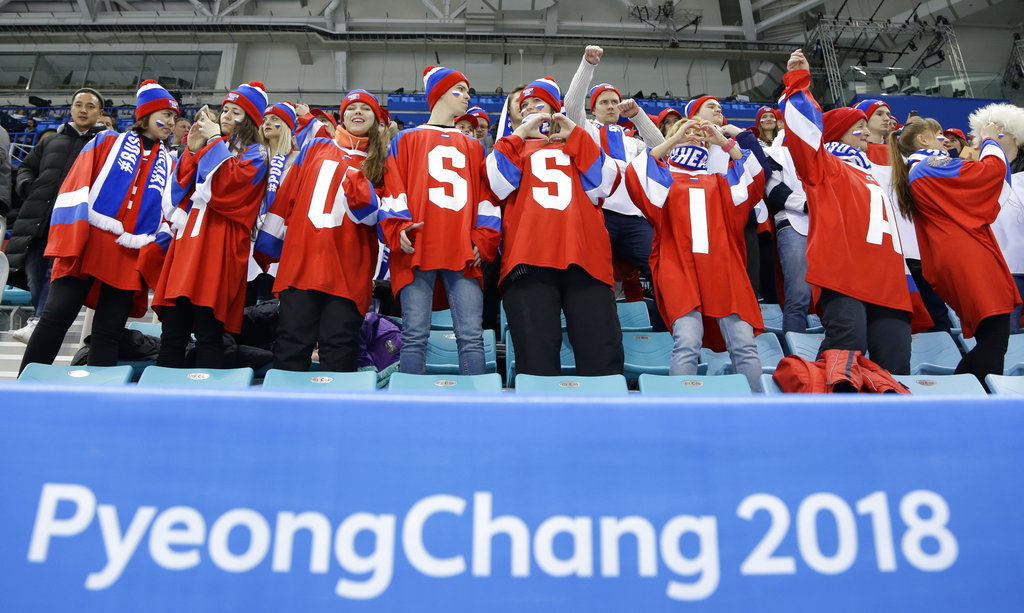Russian fans proudly flying flag at Olympics despite ban

Russian supporters wait before the preliminary round of the men’s hockey game between Slovakia and the team from Russia at the 2018 Winter Olympics in Gangneung, South Korea, Wednesday, Feb. 14, 2018. (AP Photo/Julio Cortez)
GANGNEUNG, South Korea — Ilya Kovalchuk has a rule for any fans wanting an Olympic selfie — put the Russian flag away.
The forward for the “Olympic Athletes from Russia” hockey team is worried about breaking International Olympic Committee sanctions imposed on Russia after its Sochi doping scandal. Athletes compete in neutral uniforms and have to sign a document saying they won’t protest the ruling that turned Team Russia into OAR.
Article continues after this advertisement“We won’t chase (fans) away” if they’re carrying Russian flags, Kovalchuk said Tuesday. “If there’s an IOC rule then we’ll talk to them, explain it and take a photograph without the flag.”
In the stands, though, Russian fans can be as patriotic as they like.
They’ve been a loud and proud presence at events like hockey, biathlon and figure skating, wrapped in flags and chanting in Russian. Many say they want to dress up to compensate for their athletes’ drab neutral uniforms.
Article continues after this advertisementThe fans made the half-full Gangneung Hockey Center ring with chants during the Russian hockey team’s opening game against Slovakia on Wednesday but were left disappointed in defeat.
A line of Russian women danced with pompoms, a Soviet flag flew and South Koreans lined up for selfies with a man dressed in a bear costume. “Russia is a big country and a great power,” read the inscription on one Russian flag.
“We’re shouting so much that our voices are going,” said a fan who identified himself only as Andrei. “We’re just devoting ourselves to it and supporting our athletes, because there’s not so many people here from our country.”
Many fans wore replicas of the Olympic uniform Russians had been due to wear before the IOC punishment came down in December.
Andrei Savinov, a 53-year-old from Moscow who deals in wood, hunted for souvenirs at the Olympic Park with his wife, both decked out in Russian uniforms from the 2014 Sochi Olympics.
“We bought the uniform specially so that Russianness is at least visible somehow,” said Savinov. The couple bought Olympic tickets hoping to see Russian medals in the speedskating, but top skaters Denis Yuskov and Pavel Kulizhnikov were banned by the IOC.
“Yuskov and Kulizhnikov were important. They were real gold medals,” said Savinov, who’s now planning to watch hockey and looking for spare tickets to other events.
With some of the best Russians at home, many Pyeongchang winners aren’t real champions, his wife Olga Savinova argued. “I think it reduces the level of competition,” she said. “They won’t feel like real, absolute winners. It’s sporting competition, a festival, and people had been preparing for it all their lives.”
Their opinions are echoed by the Russian government, including President Vladimir Putin, who presents Russian doping scandals as a U.S.-led attempt to weaken an Olympic rival.
Russian fans tend to buy tickets together, organizing themselves into noisy cheering sections. Many fly flags with the names of their home cities — often places in the Far East like Vladivostok, a short flight to South Korea — and wear merchandise emblazoned with the slogan “Russia in my heart,” which is being distributed by a Russian hospitality house just off the Gangneung seafront.
“Russia in my heart” started as a patriotic statement by hockey players at an exhibition tournament in December but soon took on wider political meaning on when the hockey players presented Putin with a signed jersey bearing the slogan.
That was swiftly followed by a “Russia in my Heart” rally just off Red Square — part-pep rally, part-concert, with speakers railing against the IOC decision and Western economic sanctions, talking up Russia’s military intervention in Syria and commemorating the 75th anniversary of the defeat of Nazi Germany by Soviet forces in the Battle of Stalingrad.
The climax came when biathlete Anton Shipulin, barred from the Pyeongchang Games by the IOC, ran the Russian flag up a pole as the anthem played. If “Olympic Athletes from Russia” win gold in Pyeongchang, they’ll get the Olympic flag and Olympic anthem.
“After the Olympics we’re going to raise flags and we’ll listen to our Russian anthem,” Shipulin said. “The army of fans, our whole country supporting us. That means a lot and it’s a great honor for us. And for us it’s already half of the victory.”